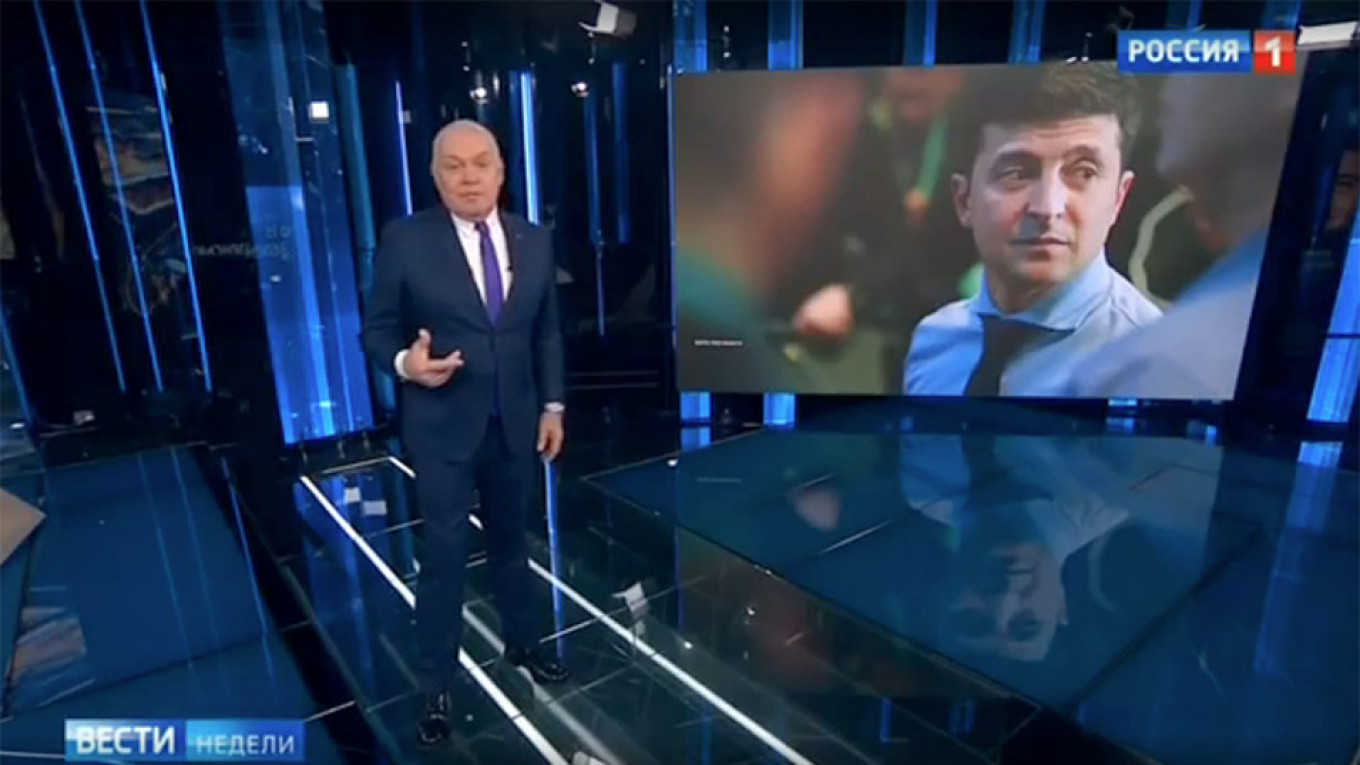Volodymyr Zelenskiy, a comedian and actor with no political experience, swept to victory on Sunday in the second round of Ukraine’s presidential election, in a race that has fascinated the country’s looming neighbor to the north.
The victory triggered speculation in Russia on Sunday that relations between the neighboring countries might improve. It also presented a moment of hope for Russia’s opposition politicians regarding the country’s next presidential elections, in 2024.
“To all citizens of post-Soviet countries: Look at us,” Zelenskiy said in his victory speech on Sunday evening. “Anything is possible.”
A national exit poll on Sunday evening showed Zelenskiy, 41, had won in a landslide, taking 73 percent of the vote with incumbent Petro Poroshenko winning just 25 percent. The result was a signal that Ukrainians are fed up with endemic corruption that has not lessened after the 2014 Maidan revolution. And it was a bitter blow for a president who had tried to rally his countrymen by presenting himself as the one leader who could stand up to Russian aggression.
That he is leaving office has pleased Russia immensely.
“Poroshenko’s term is ending ingloriously,” said Dmitry Kiselyov, a journalist commonly referred to as the Kremlin’s top propagandist, on his primetime Sunday night television show. “The country under Poroshenko degraded economically and ecologically, demographically and culturally, and under him there were a lot more lies. That is, the presidential norm became aggressive self-deception.”
Zelenskiy, who in a popular television series plays a fictitious president who likewise ascends to office with no prior experience, will step into office in June as a pro-Russian insurgency in the country’s east that has taken the lives of more than 13,000 people continues to simmer. During his campaign, Zelenskiy said the conflict can only be solved through dialogue.
Speaking on state television’s Sunday night talk shows, Russian politicians signaled their hopes that the new president may fulfill that campaign promise.
“Zelenskiy must understand that the request of Ukrainian society is to stop fighting with Russia,” said Senator Konstantin Kosachev, the chairman of the Federation Council’s Committee on Foreign Affairs. “If he realizes that this is the demand of society, we are ready to support this constructive impulse.”
On Twitter, Poroshenko wrote that he thought Zelenskiy’s win would mean celebrations in the Kremlin.
“They believe that with a new inexperienced Ukrainian President Ukraine could be quickly returned to Russia’s orbit of influence,” he tweeted.
Some close to the Kremlin expressed worries on Sunday that Poroshenko will try to hamper Zelenskiy before leaving office next month.
“He will 100 percent try to make it harder for Zelenskiy to improve relations with Russia,” said Alexander Chesnakov, a former Kremlin administration member turned political consultant.
The result presented a moment of hope for Russia’s opposition politicians regarding the country’s next presidential elections.
On Monday morning, the first official Kremlin response came via Prime Minister Dmitry Medvedev, who wrote on his Facebook page that there are “chances for improving relations.”
Zelenskiy, however, has not styled himself as a pro-Russian candidate. He has said, albeit less zealously than Poroshenko, that Ukraine’s path forward is as part of the European Union and NATO.
“He has called Putin an enemy and Russia an aggressor,” state television propagandist Vladimir Soloviev lamented on Sunday night. “Why do we have to support him?”
Good riddance
Ultimately, pro-Kremlin messaging was more about sending good riddance to Poroshenko than celebrating Zelenskiy, while using the newcomer’s inexperience, comedic background and a presidential platform short on details as a way to show Russians that Ukraine is worse off than Russia.
That had been a theme of coverage for much of the campaign. Following a nationally televised presidential debate before some 20,000 spectators in Kiev’s Olympic Stadium on Friday, a unique experience for post-Soviet countries, state television commentators described it as a farce. And on Sunday, calling the entire presidential campaign a “circus,” Kiselyov said that the debate was, “in the dumb sense, an act.”
 Vesti
VestiBut for Russian opposition politicians who have been starved for electoral competition, Ukraine’s presidential election provided a breath of fresh air.
“I congratulate Ukraine and Ukrainians,” tweeted Alexei Navalny, an opposition leader who was barred from participating in Russia’s presidential elections last year, “with fair elections — a rare thing in the territories of the former Soviet Union.”
Yet while the Kremlin may be relieved to no longer have to deal with Poroshenko, and while it may be eager to try to take advantage of Zelenskiy’s inexperience, some have argued that, in the long run, Putin may come to regret his election.
“Poroshenko’s Ukraine, a hostile country that has turned its back on Russia to look toward NATO, was a useful bogeyman for Russian domestic politics, an example of what route not to follow,” Alexander Baunov, a senior associate at the Carnegie Moscow Center, wrote last week.
“Under a President Zelenskiy, Ukraine would go from being a foreign-policy problem for Russia to becoming a domestic one. An amiable, fresh young president with a sense of humor, who is focused on domestic issues, would become — in the eyes of an indeterminately large proportion of Russians — an alternative to Putin.”
